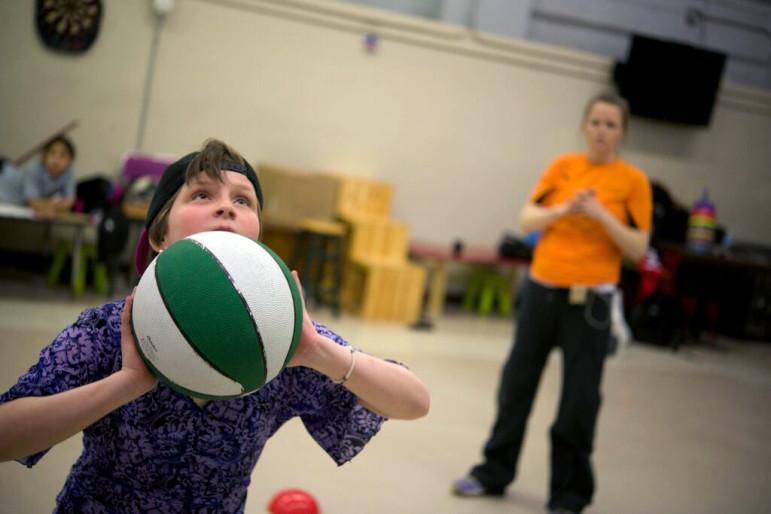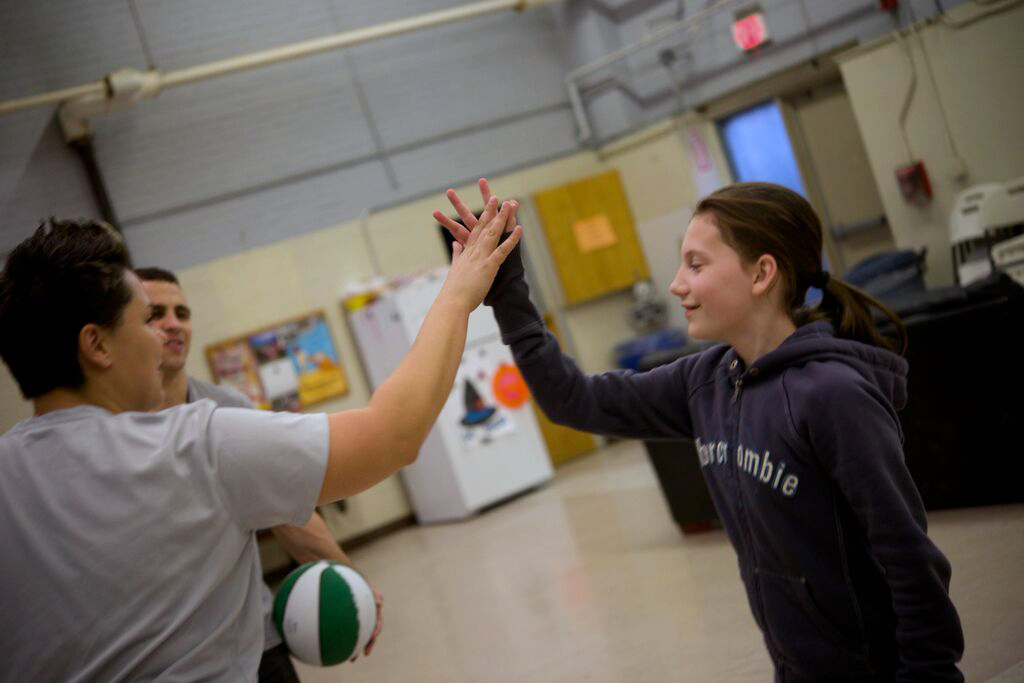Footballs fly through the air as coaches and 12- and 13-year-old athletes play catch to pass the time until their Chalk Talk teammates arrive. As players walk onto the field, coaches call for an opening “Circle up!” Hellos are exchanged, and the coaches introduce the curriculum skill of the day: “Step to your strengths.”
Doc Wayne, named after pediatric surgeon and sports enthusiast Dr. Eli Wayne, is a Boston area nonprofit that fuses sport and therapy to heal and strengthen youth through three programs: Chalk Talk sport-based group therapy, Global Life Empowerment youth leadership program and Therapeutic Sports Program, a competitive therapeutic league.
Children who participate in Doc Wayne’s Chalk Talk program are most often survivors of complex trauma. According to the National Alliance on Mental Illness, 4 million low-income youth have serious mental health challenges, but 80 percent of them do not receive the mental health services they need. Here is where Doc Wayne intervenes to provide engaging services to Boston area youth. In an evaluation published in the Journal of Family Violence, Wendy D’Andrea, Ph.D., documented improvements in positive peer-to-peer interactions, conflict resolution and helping behaviors. Additionally, decreased aggression was noted.
Chalk Talk: Trauma-informed therapy
Run by trained coaches and licensed mental health clinicians, Chalk Talk delivers a uniquely designed curriculum through the medium of sport. This curriculum, Do the Good, is a trauma-informed sport-based adaptation of dialectical behavior therapy and the Attachment, Self-Regulation, and Competency Framework.
Chalk Talk provides a forum for therapy to approximately 100 Boston area youth through soccer, basketball, flag football and indoor rowing, participating one to three times per week after an initial assessment in their local community, school or treatment center.
Doc Wayne encourages all players to participate in the drills and exercises to learn life skills. We believe it is not simply the power of sport that changes lives but an intentionally designed sport experience that makes the difference. In addition to active participation, sport-based group therapy provides various other avenues for learning. As long as the player is mentally engaged through watching or cheering on others, he or she is gaining vital developmental tools, such as self-regulation, problem solving and self-esteem.
[Related: Screening Youth for Depression Saves Lives]
Chalk Talk: The game
In one Chalk Talk session, before starting drills, coaches ask players to keep in mind a few questions: What are your strengths? Why is it important to know what your strengths are? In the drill that follows, players practice the “show up” skill, focusing on the importance of being present for every play of the session — and in life. Players are paired and instructed to play catch. After one minute, the player without the ball turns his or her back toward the other. When the player with the ball yells, “Show up!” the other quickly pivots and catches the ball. Roles then switch.

Social Innovation Forum
Youth participate in skills and drills portion of Chalk Talk sport-based group therapy at Doc Wayne’s after-school program.
Coaches make an offensive and a defensive line, then encourage players to remember their strengths during each play. The coaches throw balls to the offensive players who run routes to keep the ball away from the defensive players. The lines then swap. Next, the youth scrimmage for 12 to 15 minutes, while coaches encourage players to pay attention to their strengths.
To close the scrimmage, the whistle blows and coaches shout, “Circle up!” During this key point of the session, the athletes reflect on their strengths throughout the drills and scrimmage, and share with the group. In closing circle-ups, youth praise, giving “shoutouts” to each other, such as “You are awesome at catching and are a great teammate.”
They begin to recognize their own strengths and may say, “I never realized I could score a touchdown.”
Players often report having accomplished their goals for the session, and coaches remind them to set additional goals and strive to reach their positive path on and off the field.
As the players disperse from the field, they take an understanding of flag football and of their own strengths and the significance of showing up — to life or to the football field.
Rebekah Roulier, LMHC, is the associate director of Doc Wayne Youth Services and a licensed mental health counselor with a diverse background of sport psychology, psychotherapy and nonprofit management. Ruthie Lynes is a marketing and communications CO-OP student from Northeastern University. Doc Wayne was recently recognized as an Influential Leader and Model for Others Making Communities Healthier Through Sport by the Robert Wood Johnson Foundation.
More related articles:
Schools Stand Up Against Bullying on Unity Day
Peer Mentoring: Youth Who Faced Mental Health Issues Now Aid Others
California Curbs Overuse of Psychiatric Meds on Foster Children




























